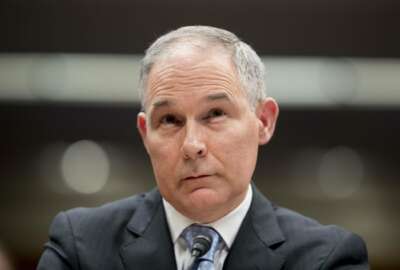What the 2021 NDAA means for future whistleblowers
The National Defense Authorization Act for 2021 is, like NDAAs tend to be, a vehicle burdened with semi-related policy provisions.
Best listening experience is on Chrome, Firefox or Safari. Subscribe to Federal Drive’s daily audio interviews on Apple Podcasts or PodcastOne.
The National Defense Authorization Act for 2021 is, like NDAAs tend to be, a vehicle burdened with semi-related policy provisions. One would change the long standing relationship between whistleblowers and federal law enforcement when it comes to money laundering and terrorist finance. Executive Director of the National Whistleblower Center John Kostyack had more details on Federal Drive with Tom Temin.
Interview transcript:
Tom Temin: John, good to have you back.
John Kostyack: Hey, thanks for having me, Tom.
Tom Temin: First of all, tell us how the NDAA addresses whistleblowers in the first place in general, and it sounds like it’s generally a good thing.
John Kostyack: Yeah. And we are very pleased about the anti money laundering, anti terror financing provisions of this bill as a whole, and very pleased that Congress recognized that whistleblowers will be critical or getting evidence to prosecutors about money laundering and terrorist financing. So that’s a great start. There was really important work done by Sen. Warner, Sen. Grassley and others in writing a bill called the Illicit Cash Act, which recognized the role of whistleblowers in fighting the scourge of money laundering, and essentially copied over the key tenants of the Dodd-Frank Act, which say whistleblowers have the ability to submit confidential information without having their identities revealed. And they will be guaranteed any award, which is a share of the proceeds that prosecutors secure, the monetary sanction security against.
Tom Temin: That is to say, if the whistleblower is aware of an institution’s loaning of money that the whistleblower believes will ultimately result in terror financing, for example?
John Kostyack: Or other kinds of criminal activity. So, a large portion of the money, unfortunately, that runs through our international banks is the proceeds of criminal activities that the criminals are trying to use for their own benefit, but need to get into the banking system. And so any bank that is complicit with laundering that money has a major legal exposure. But this is very complex information is hidden in complex financial documents that only people on the inside will understand. And that’s why we need whistleblowers so badly. And these whistleblowers are typically well compensated executives who are very hesitant to risk their careers and bring this information forward. So the answer which the Dodd-Frank Act provided when it was enacted back in 2010, is let’s provide a reliable confidential channel for submitting tips about these crimes. to federal enforcement officials. Let’s guarantee them a share of the monetary sanctions that the whistleblowers are responsible for delivering to taxpayers and injured shareholders and alike. So that has been working quite well, under the Dodd-Frank Act. It was intended to be carried over to the money laundering provisions, and most of it was. But there was a key provision that was removed. And that was the minimum guaranteed share of the award that would go to the whistleblower. And that’s the part that has us significantly concerned, because it without a minimum amount, the Treasury officials responsible for running this whistleblower program, basically will have 100% discretion about whether to reward the whistleblowers. If you are a whistleblower, sitting back trying to decide whether to make the big move, most people have never done this before. And it’s a highly uncertain and risky endeavor. They’re going to want to know that there is a safety net, financial safety net.
Tom Temin: Sure. And just until now, in the cases that have already been brought over the past few years since Dodd-Frank, what types of settlements do whistleblowers tend to get? Is it hundreds of thousands, millions, tens of thousands?
John Kostyack: Yeah, so the largest one recently came out, and it was over $100 million. Most of them are much smaller than that. But the important point is for the whistleblowers to watch this stream of awards coming from the SEC under the Dodd-Frank Act, just say, okay, they recognize my value, and I am going to have a positive working relationship with this agency. And there’s no ambiguity about whether or not the person who is in charge of the awards will do the right thing. Now, in the case of money laundering, the responsible officials will be over at Treasury, most likely in the [Financial Crimes Enforcement Network] office. And they don’t have a history of issuing whistleblower awards. They have had discretionary authority to issue awards in the past, that really has not been used, and certainly not publicized. And part of this work has got to be the publicity part of the education of potential whistleblowers. So we have an ability to go out right now to whistleblowers and say, guess what, we have now an acknowledgement that you will be awarded, but we can’t tell you how much. And so that’s a major part of the calculus and the risk reward calculus that a whistleblower will undertake?
Tom Temin: Sure, so it could be then in theory, for a big multi $100 million case it could be “here’s $50, enjoy lunch with your wife.”
John Kostyack: Exactly. And that’s our big concern. This is really not about the good faith of particular Treasury officials. You know, we’d like to presume good faith. It’s really about how we as an organization, And other pro-whistleblower organizations can go out to the world and educate them about these provisions. We don’t want to mislead whistleblowers. We have to be honest with them to say, all right, as it stands right now, we cannot guarantee you any significant dollar amount.
Tom Temin: We’re speaking with John Kostyack. He’s executive director of the National Whistleblower Center. So are you asking Congress to change the law such that the FinCEN would have some kind of a schedule of awards? Or would you just stick with SEC as the awardee? What change would you like to see?
John Kostyack: Well, ideally, Congress would go back and clean this up. We’re not sure how this happened. But we imagine that Congress, which has shown great bipartisan support for whistleblower programs would be interested in that conversation. So we will do that. There’s also an opportunity to work over at Treasury, they have to write regulations to implement this law. There’s nothing in the law that prevents them from using the regulations to set a guaranteed minimum award level for whistleblowers. So that might be the faster route. We will try them both.
Tom Temin: And what about the provision in the NDAA that those people that work at FDIC insured institutions are exempt from this?
John Kostyack: Yeah, that’s the anti retaliation provision. So I should have emphasized at the beginning – we’re happy in general about the new protections against retaliation of whistleblowers that are awarded for those who report on money laundering. But there was an exemption carved out for whistleblowers, and FDI-insured institutions, as well as credit unions, and so they are left with the existing retaliation protections, which are under OSHA, the Department of Labor, which have not been working so well. There have been – there’s a serious backlog over at OSHA. And we can give whistleblowers great assurances that they will be protected from retaliation by relying upon that system. So we would have preferred that they tap into this new system. And unfortunately, the new system is not available to all.
Tom Temin: And let me just ask you a question. My own background, lack of knowledge, and that is we know that money laundering and terrorist financing happens, but how frequent is it that it would happen under the knowing stewardship of a publicly traded or FDI-insured institution in the first place, where it would take a high level officer, someone familiar with the details to know that it’s going on? It’s hard to believe that a legitimate institution would involve itself knowingly in this at all.
John Kostyack: Well, you know, this is the case with fraud. Corporate fraud in general is we are always shocked when we learned about it after the fact. But it has been a repeated pattern that people who are given enormous financial incentives, oftentimes their bonuses are hitched to large financial transactions will align themselves to criminal activity around them, and will participate at various levels that it always shocks the conscience when we hear about it, but it is a pattern. The key difference maker is whether or not there’s a deterrence. If there’s no evidence of enforcement of these crimes, then you’re going to find more and more people jumping into the fray and taking advantage of the large financial benefits of participating in large scale corporate crime. We think that there’s many honorable people in the banking system, but there’s enough people who will be tempted by the large financial benefits of working with international criminals, that we need to have an effective system of enforcement to deter that.
Tom Temin: Sure. And as a practical matter, this NDAA for 2021 kind of skidded into law by a override a presidential veto just over the couple of long weekends we had for Christmas and New Year’s. And so here we are waking up to this law. What’s your next step? Because there’s a brand new Congress now, and they’re probably working on 2022?
John Kostyack: Yes. Well, certainly what’s gratifying and looking at that veto override vote is that there is broad bipartisan consensus. Obviously, there’s other provisions of this law that are attractive to both parties. But the anti money laundering agenda is one that is shared by both parties. And that we have enormous opportunities to continue to make progress on this issue with Congress. And so yes, we will be going back and seeing how we could advance this further.
Tom Temin: John Kostyack is executive director of the National Whistleblower Center. Thanks so much.
John Kostyack: Hey thank you for having me, Tom.
Tom Temin: We’ll post this interview at FederalNewsNetwork.com/FederalDrive. Subscribe to the Federal Drive at Apple Podcasts or wherever you get your shows.
Copyright © 2025 Federal News Network. All rights reserved. This website is not intended for users located within the European Economic Area.
Tom Temin is host of the Federal Drive and has been providing insight on federal technology and management issues for more than 30 years.
Follow @tteminWFED
Related Stories





